
Reports & Resources
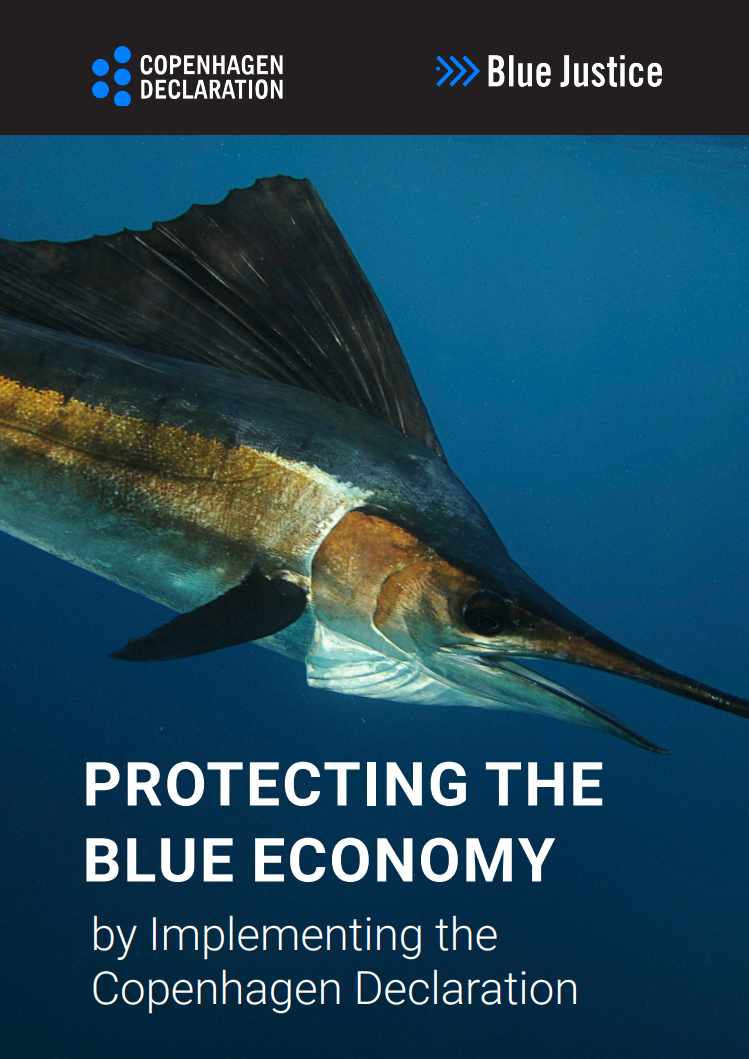
Protecting the Blue Economy
This report presents the impact of five years of bringing together a broad spectrum of actors and what has become 60 Declaration countries under the umbrella of Blue Justice, supporting the operationalisation of the Copenhagen Declaration.
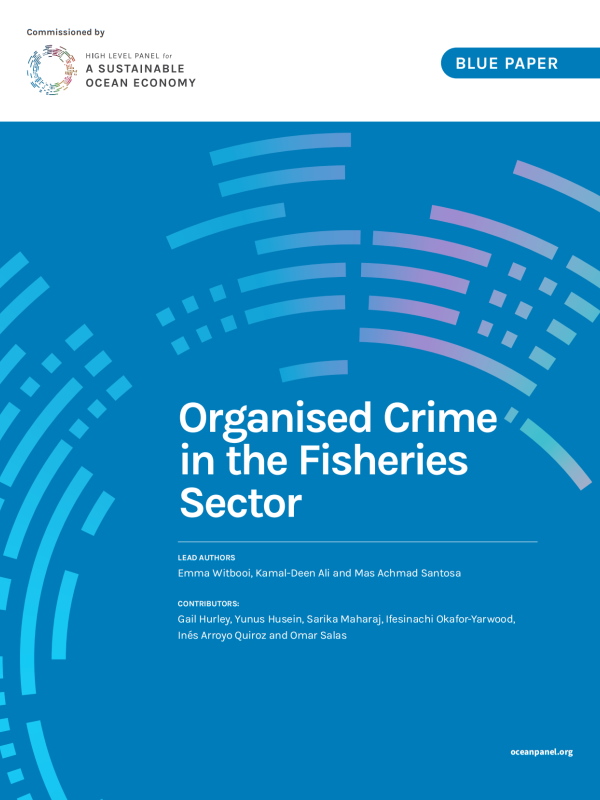
Organised Crime in the Fisheries Sector
Organised crime in the fisheries sector is an often-overlooked barrier to securing a sustainable ocean economy, despite threatening coastal states’ food security, fostering human rights abuses and diverting government revenue to the shadow blue economy.
This Blue Paper spotlights the problem and draws from current promising practices for addressing organised crime in the fisheries sector to present practical opportunities for action – globally, regionally and nationally. One of the key challenges in this space is the development of a joint understanding of the problem at hand – shedding light on the pervasive impact of this shadow industry. We feel this Blue Paper provides a solid foundation of experience and best practice that can be used to develop solutions to be implemented immediately in conjunction with sustainable fisheries management strategies.
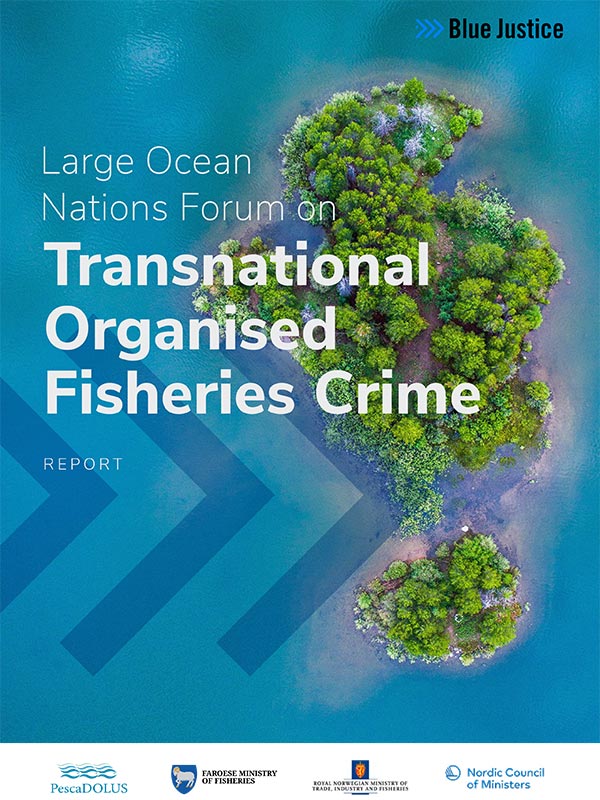
Large Ocean Nations Forum on Transnational Organised Fisheries Crime
The Large Ocean Nations Forum on Transnational Organised Fisheries Crime was launched at the UN City in Copenhagen on 15 October 2018. The forum was hosted by PescaDOLUS in cooperation with the Faroese Ministry of Fisheries, the Norwegian Ministry of Trade, Industry and Fisheries and the Nordic Council of Ministers.
The forum, which gathered more than 80 participants from Large Ocean Nations (LONs) as well as from other countries, intergovernmental organizations and civil society, was opened by the Ministers of Faroe Islands, Palau, and Kiribati alongside high-level participants from the Nordic Council of Ministers and Norway.
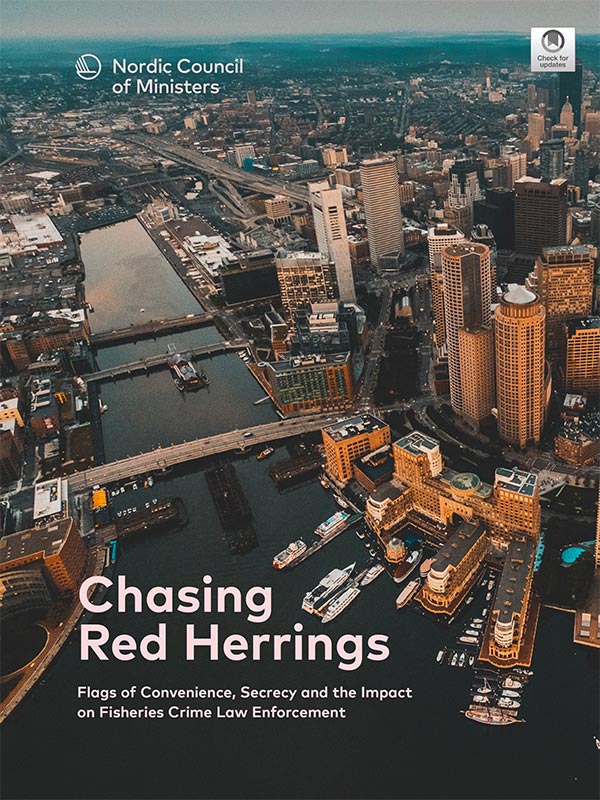
Chasing Red Herrings
What are the impacts of flags of convenience and secrecy to the global effort to curb fisheries crime?
In monetary terms, crimes in the fisheries sector – fisheries crime – are vastly profitable. A conservative estimate is that as much as USD 23.5 billion is lost to illegal and unregulated fishing each year. Still, the actual costs of fisheries crime to society, including tax crime and other ancillary crimes in the fisheries sector, far exceed the value of lost resources. Vulnerable coastal states lose out on revenue, employment opportunities and infrastructure development, and suffer the consequences of food insecurity, instability and loss of biodiversity.
This report is a joint effort between the INTERPOL Fisheries Crime Working Group (FCWG) and the North Atlantic Fisheries Intelligence Group (NA-FIG). It is a record of the conclusions and findings of a multi-disciplinary group of auditors, investigators and analysts who have come together at regular intervals over the last four years to analyse and discuss their experience and knowledge about flags of convenience and secrecy and their impacts on fisheries crime law enforcement.
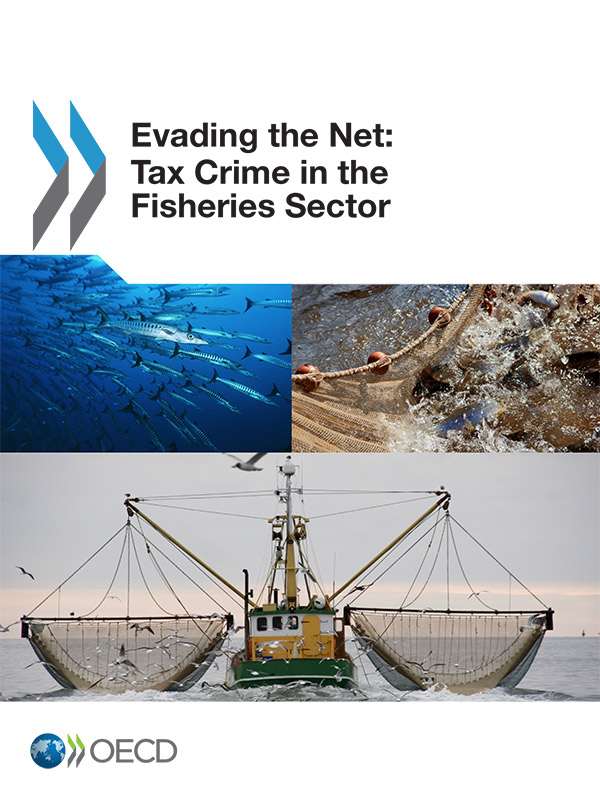
Evading the Net: Tax Crime in the Fisheries Sector
This report, prepared by the OECD Task Force on Tax Crimes and Other Crimes, looks at the issue of tax crime in the fisheries sector, and the impact this has on the ability of countries to raise government revenue to fund public expenditure and development.
The fisheries sector is a major global industry, with strategic importance for many countries. In 2010, fisheries and aquaculture provided fish with a total value of USD 217.5 billion. Developing countries are a major participant in this market, providing over 50% of the world fish trade, which contributes a greater amount to their net earnings from foreign exchange than meat, tea, bananas and coffee combined. The Food and Agriculture Organization of the United Nations (FAO) estimates that over 500 million people in developing countries depend, directly or indirectly, on fisheries and aquaculture for their livelihoods. However, despite these positive statistics, the fisheries sector remains vulnerable to organised criminal activity that not only inhibits the ability of countries to enforce fisheries policy, but directly impacts the economic and social wellbeing of people in both developed and developing countries. A 2011 issues paper by the United Nations Office on Drugs and Crime (UNODC) focused on the role of large-scale organised criminal groups operating within the fisheries sector in the trafficking in persons, the smuggling of migrants and the smuggling of illicit drugs, weapons and illegal tobacco, but found evidence of vulnerabilities to a wide range of organised crime. This report, prepared by the OECD Task Force on Tax Crimes and Other Crimes, looks at the issue of tax crime in the fisheries sector, and the impact this has on the ability of countries to raise government revenue to fund public expenditure and development. Organised crime is rarely restricted to one sphere, and so a greater understanding of the ways to detect and combat tax crime, should also have a direct positive impact on the ability of countries to combat other criminal activity.
Blue Justice Initiative Reports
Report of the CRFM Ministerial Meeting on Illegal, Unreported, and Unregulated Fishing and Transnational Organized Crime in the Fishing Industry, Belize City, Belize, 4 October 2021
September 21, 2022
Discussion Document on Protecting and Incentivizing Whistleblowers to Combat Fisheries Crimes
November 25, 2021
Discussion Document on Security Implications of Organized Crime in the Fisheries Sector
December 15, 2020
Human Trafficking in Fisheries from the Perspective of the UNCLOS Provision that Bans Slavery – The Case Study of Indonesia
November 19, 2020
Fisheries Crime in the Containerized Trade Supply Chain: Examples from East Africa
November 12, 2020
Implications on Coastal Communities of Fisheries Crime: Examples from Nigeria and the Gulf of Guinea
October 22, 2020
Gender and Fisheries Law Enforcement
October 15, 2020
The Synergies and Convergence of IUU Fishing and Transnational Organized Fisheries Crime
October 14, 2020
Smuggling of goods and human smuggling in the Caribbean, the role of the fisheries sector
October 8, 2020
Maritime Security and organized crime: examples from the Gulf of Guinea
October 1, 2020
Stretching the Fishnet: Addressing Crimes in the Fisheries Value Chain
September 17, 2020
The Copenhagen Declaration: Why does it matter
September 10, 2020
Human Trafficking the Fisheries Sector: The Indonesian Example
September 3, 2020
Fisheries Crime and the 2030 Agenda: How do the SDGs Address and Help Tackle Fisheries Crime
August 27, 2020
Report of consultation on Covid-19 Implications for Fisheries Crime Law Enforcement
June 29, 2020